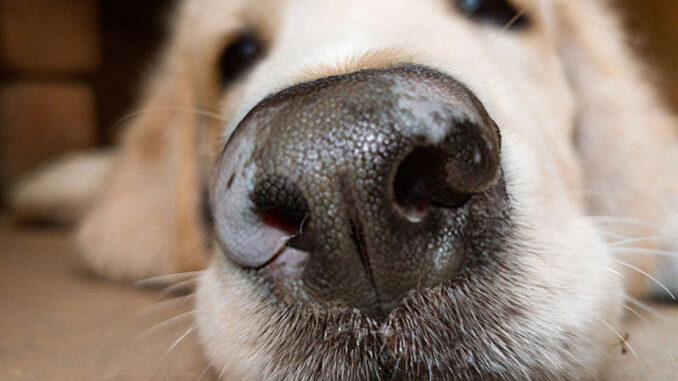
This article was updated on March 11th, 2024

Your dog’s skin is an ever-changing organ. It grows, regenerates, and even changes color. One of those color changes that you may see is white spots on your dog’s nose. These white spots may be a permanent pigment change or just a temporary discoloration. If you notice white spots on a dog’s nose, the first thing to do is look for other signs, such as itching or irritation, nose discharge, or pain.
Whether these white spots are a new development or have been there for a while, you should have any changes to your dog’s skin checked out by a veterinarian. Let’s review the most common causes.
Common causes of white spots on a dog’s nose
The causes of white spots on a dog’s nose can vary from something as deep down as pigment changes in the skin to something as superficial as a fungal infection on the surface:
1. Depigmentation
A dog’s (and human’s) skin gets its color from pigment cells called melanocytes. Exposure to things in the environment, including the sun, can cause increased production of those melanocytes to make skin turn darker. Of course, the opposite can happen as well. Depigmentation of the skin of the nose can cause white spots.
Snow nose
Some dog breeds, mainly those that live in colder climates, may see white spots seasonally with the onset of fall and winter. Their noses will usually darken again in the spring and summer. Huskies, Labs, Golden Retrievers, and Bernese Mountain Dogs are the common culprits.
Snow nose doesn’t hurt anything, it only gives you pup a little changing for the seasons. No treatment is needed.
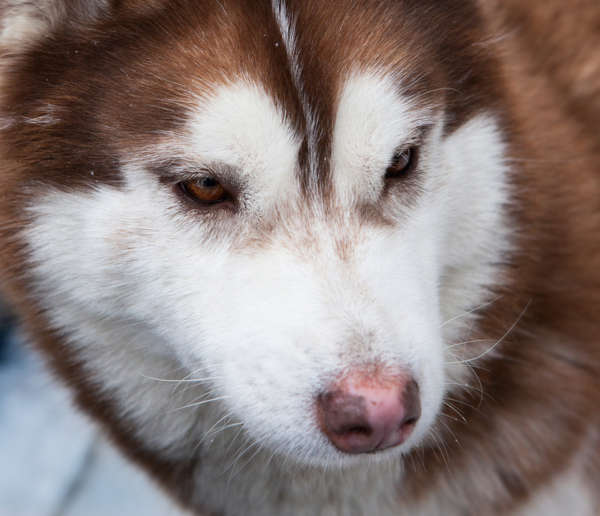
Vitiligo
Back to those melanocytes that produce pigment-vitiligo, which is a disease that can create white spots because of the death or destruction of those cells. The reasons vitiligo occurs in dogs are unknown, but there is a genetic component that makes breeds like Rottweilers, Huskies, Golden Retrievers, and Dachshunds more commonly affected. Like snow nose, vitiligo doesn’t hurt anything and doesn’t need treated.
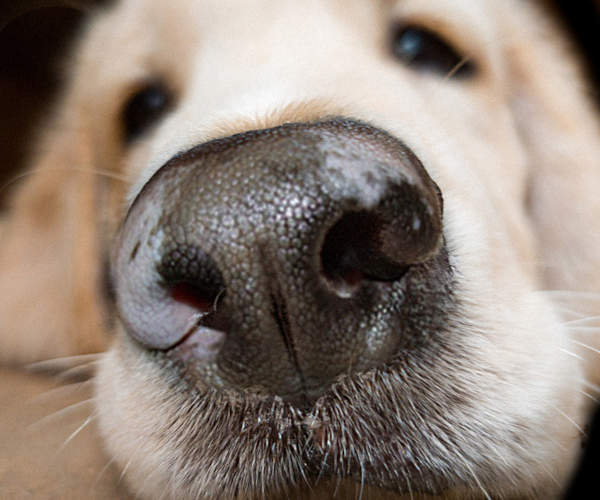
2. Immune-mediated diseases
In most dogs, the immune system is there to protect them, but sometimes that immune system goes haywire and starts to attack its own body. Immune-mediated diseases like pemphigus foliaceus and discoid lupus erythematosus can cause white spots on the nose and other parts of the face. You may also see blistering or redness around the spots. There may be itching, sneezing, watery eyes, and a runny nose. Immune-mediated diseases may be hereditary and are often triggered by things like medication or sun exposure.
Immune-mediated diseases that cause white spots on the nose can often be diagnosed with a skin biopsy. Depending on the disease and severity, immune-suppressing drugs like steroids can help. See the example picture below or on umassmed.edu (Lupus in Dogs).
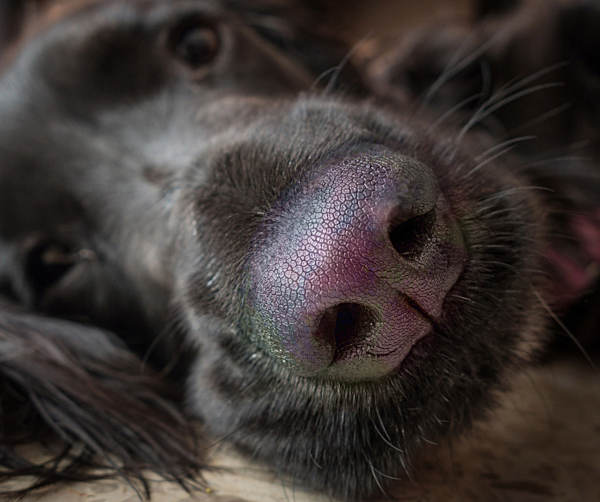
3. Infection
Bacterial and fungal infections are another cause of white spots on a dog’s nose. These can create irritation or pustules that may be white with redness, swelling, or oozing. You may also notice an odor, and the spots may be itchy.
Along with this, the cause of white spots on a dog’s nose may be pimples. Dogs get whiteheads, too, when a hair follicle or skin pore gets clogged. This can lead to a pus-like discharge that makes it appear white.
A vet should check out infections that make white spots on your dog’s nose. They will be able to diagnose with a swab, scraping, or biopsy and treat with the appropriate medications.
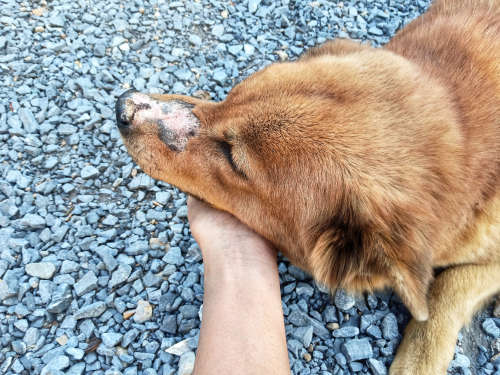
4. Irritation
A dog sticks its nose into everything; that’s no secret. But all of that nosiness may have a consequence. Frequent rubbing or scraping a nose can create white spots since it disrupts the skin on the long-term. Dogs that are kenneled or that try to tunnel under their fence may see this more often. Along with the white spots, you may also see swelling or redness; the spot may bleed or become secondarily infected.
Removing the irritating reason will be the best treatment, along with topical ointments to soothe and repair the skin. See the picture below for an example, or go to PetCoach.co to view this case.
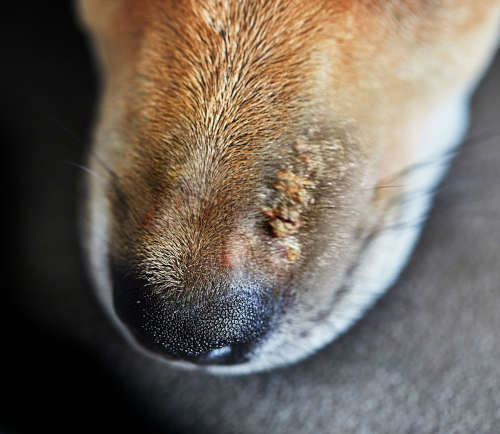
5. Nasal hyperkeratosis
Keratin is a component of skin, hair, and nails. Hyperkeratosis is the overproduction of that keratin, creating a cracked, dry nose with what can only be described as a “buildup” of keratin on the tops and sides. Foot pads may do the same as well. Nasal hyperkeratosis is more often seen in middle-aged to older dogs and may be hereditary in some breeds like Labs.
Moisturizers, like vitamin E and shea butter, may help the cracking and dryness. In some cases, the extra keratin may need to be removed.
6. Others
A few other causes of white spots on a dog’s nose to throw in there are tumors, hypothyroidism, and allergies. Aging can even cause lightening of the skin on the nose. If you notice white spots on your dog’s nose, see your vet, as some of these causes may require immediate treatment for the best outcome.
Should I be worried about these white spots?
Some white spots may show up suddenly, and some may take a more gradual approach. Either way, any changes in your dog’s skin coloring or texture should be checked out. This is especially true if you notice any signs of redness, swelling, or discomfort in your dog’s nose or changes in other parts of their skin.
Is it ok to wait-and-see?
If your pup has no other signs of inflammation or discomfort, you may choose to monitor the spot for a couple of days. If the spot doesn’t grow, change color, or shape, and still isn’t causing your dog any trouble, you may just keep it in mind to ask your vet at your next appointment.
When to make a vet appointment
On the other hand, if your pup is having some discomfort or the white spot is surrounded by redness, swelling, flaking, or oozing, see a vet as soon as possible. You may also choose to see a vet if the white spot that you’ve been monitoring has changed recently or your dog’s behavior, such as appetite and activity level, has changed as well.
Diagnosis at the veterinarian
When you get your dog to the vet, the first thing they’ll do is a thorough exam, not only of the white spots on the nose but the rest of the body as well. They will want to know when the white spots showed up, if they’ve changed, and if you’ve tried any treatments.
From there, the vet may take some samples either through an impression smear, where they touch a microscope slide to the spot, a skin scraping, or a fine needle aspirate, where they remove some cells with a syringe and needle. In some cases, a biopsy using local anesthetic may be necessary. These samples will help determine exactly what the spots are and which treatment path, if any, they will take.
Treatment Options for white spots on a dog’s nose
A lot of causes for white spots on a dog’s nose won’t require any treatment. These are things like vitiligo, snow nose, or mild cases of nasal hyperkeratosis. Just keep in mind that this lighter skin may need protection from the sun, so consider using sunscreen when going into direct sunlight.
Infections or irritation may require antibiotics, antifungals, or anti-inflammatories to treat, and immune-mediated diseases will need immune suppressants for life.
Tumors and moderate to severe nasal hyperkeratosis may require surgery to remove. Systemic issues like hypothyroidism will require lifelong medication and monitoring.
Look to pay anywhere from $100 for an exam and scraping or smear to $400 for an exam and biopsy. Treatment may cost you $50 for one-time medications or $20 or more per month for life. Surgery may cost $500-$1000 or more, depending on the extent.
Would a vet be able to help over a video call?
Anything dealing with a dog’s skin is really a hands-on situation. Your vet will want to be able to see and touch the spots as well as take samples to get a definitive diagnosis. However, a video call may be helpful initially to determine if the white spots on your dog’s nose are an immediate issue or if further testing can be done later.
FAQs
Can white spots on a dog’s nose be harmful to their health?
Causes of white spots on a dog’s nose, like infection, immune-mediated diseases, tumors, or hypothyroidism, can be harmful to a dog’s health if it isn’t treated. That’s why it’s important to have any changes in a dog’s skin checked out by a vet.
Are certain breeds more susceptible to developing white spots on their nose?
Cold climate pups, like Huskies and Labs, may be more prone to snow noses, and breeds like Golden Retrievers and Dachshunds may be more prone to vitiligo.
Can a dog’s nose turn white due to old age?
In a similar way that hair loses pigment with age and turns grey or white, the skin on a dog’s nose may do the same. This type of whitening won’t cause any irritation or discomfort.
How can I protect my dog’s nose from sunburn?
The lighter skin on a dog’s nose can be more prone to sunburn, so protecting it from the sun is a must. Try to keep your dog out of the direct sun, especially during the hottest parts of the day, and use a dog-safe sunscreen.
Is depigmentation in dogs reversible?
Often, when a dog’s skin loses pigmentation, it’s permanent. However, in cases of snow nose, the skin will normally change color with the seasons.
Disclaimer: This website's content is not a substitute for veterinary care. Always consult with your veterinarian for healthcare decisions. Read More.



Be the first to comment